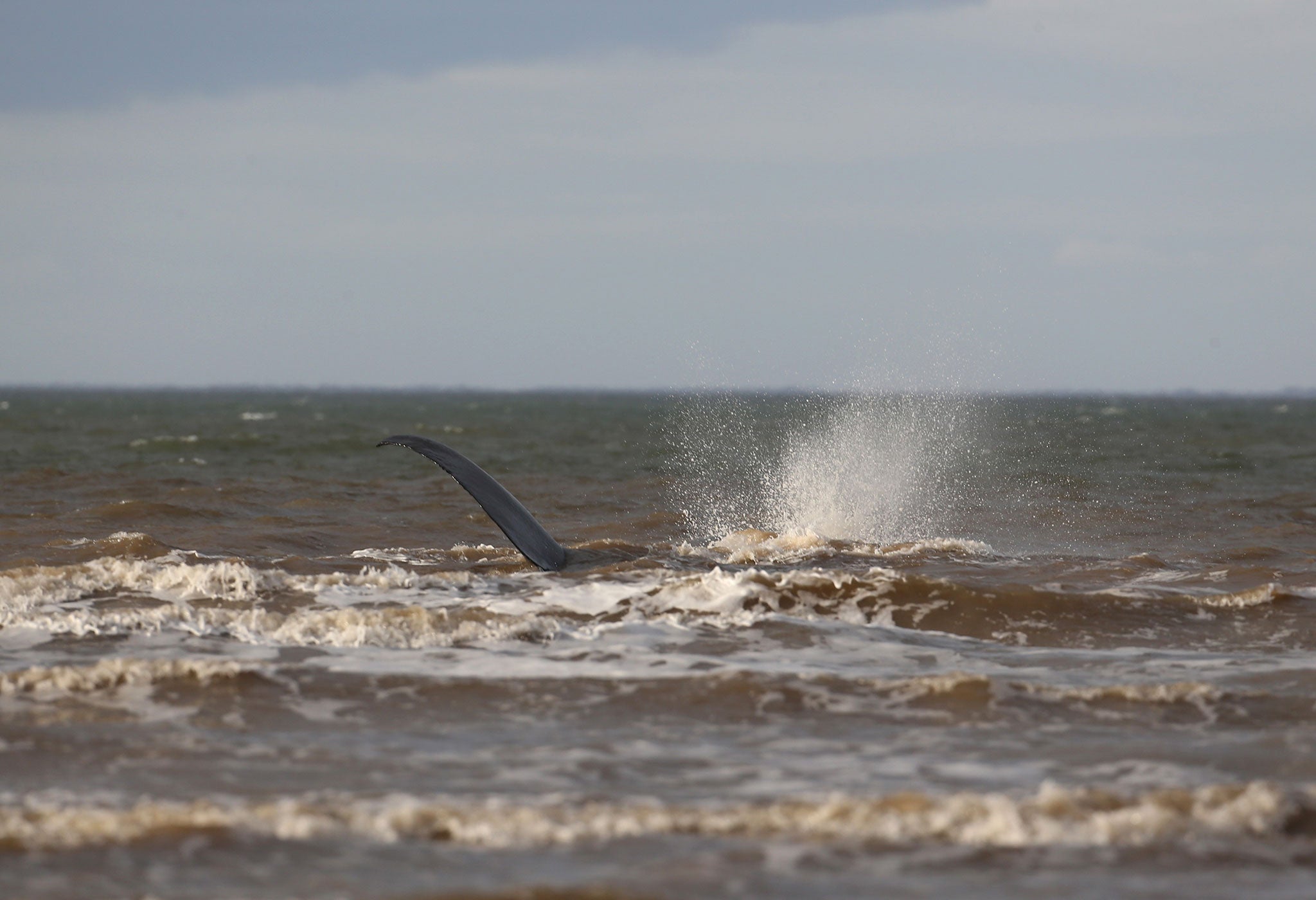Hunstanton whale: 'No hope' of saving sperm whale stranded on Norfolk beach
The whale was said to be alive when it beached on Thursday morning

Wildlife rescuers have said there is no hope of saving a sperm whale stranded on Hunstanton Beach.
The mammal was still alive and breathing when it was beached on Thursday morning but it was expected to die by the end of the day.
Coastguards and staff from Hunstanton Sea Life Sanctuary had put a cordon around the whale for its “dignity” but could do nothing to save it, the British Divers Marine Life Rescue (BDMLR) said.
Stephen Marsh, the organisation’s operational manager, told The Independent it was impossible to rescue beached sperm whales because of their size and weight, meaning they cannot be rolled back into the sea.
“We are just trying to give it dignity and let nature take its course,” he said.
“It’s alive at the moment and it might re-float but I doubt it would be in a fit state to swim out into the open ocean.”
As the tide came back in on Thursday afternoon the whale was partially submergedand could be seen thrashing in the water, although it still appeared to be trapped in the shallows.
Hunstanton Sea Life Centre manager Nigel Croasdale told Sky News he was “not expecting a successful outcome”.
“Nature will take its course,” he added.
“The water may be deep enough for the animal to swim off. It may drift in the high water and end up becoming beached further along the coastline further this evening.”
The Coastguard said it was alerted to the 14-metre whale's arrival at 7.30am and said its team had set up a cordon at the "very distressing scene".
West Norfolk Borough Council was urging members of the public not to travel to the beach.
“We're aware that another whale has become stranded on Hunstanton beach,” a statement said.
“We're involved in a multi-agency approach to assessing the situation.
“We're not encouraging people to visit the scene, but if you do, please be mindful of your own safety.”
Thursday’s stranding was the 29th in Europe in the past two weeks, and the sixth in The Wash – the North Sea bay between Norfolk and Lincolnshire – during that period.
Although the deaths have shocked and saddened local communities, as well as whale-lovers around the world, it could indicate growing populations of sperm whales.
Dead whales beached on the North Sea coast
Show all 8“Whales used to strand in the UK quite regularly before we started killing them all with whaling, so this could be a sign of population recovery,” Mr Marsh said.
Officials from Defra are conducting post-mortems on beached whales and investigating what is causing so many to wash ashore in Britain, with a report expected later this year.
The latest whale beached just two miles east from where another sperm whale was found in Hunstanton almost a fortnight ago in one of a series of strandings thought to be from the same pod.
Three other dead sperm whales were discovered washed up on the Lincolnshire coast, including one that later “exploded” in Skegness, and another washed up near Wainfleet, Lincolnshire.
Dr Peter Evans, director of the Sea Watch Foundation, said “this kind of thing happens periodically as sperm whales congregate in social cohesive groups which we call pods and often strand together”.
“They feed principally on squid and what has probably happened is that one or more of the shoals of squid have entered the North Sea from the Atlantic and the whales followed them, fed upon them, and then maybe ran out of food.”
Other theories say the whales may have come too close to shore while migrating from polar regions to warmer water in search of mates.
Subscribe to Independent Premium to bookmark this article
Want to bookmark your favourite articles and stories to read or reference later? Start your Independent Premium subscription today.

Join our commenting forum
Join thought-provoking conversations, follow other Independent readers and see their replies